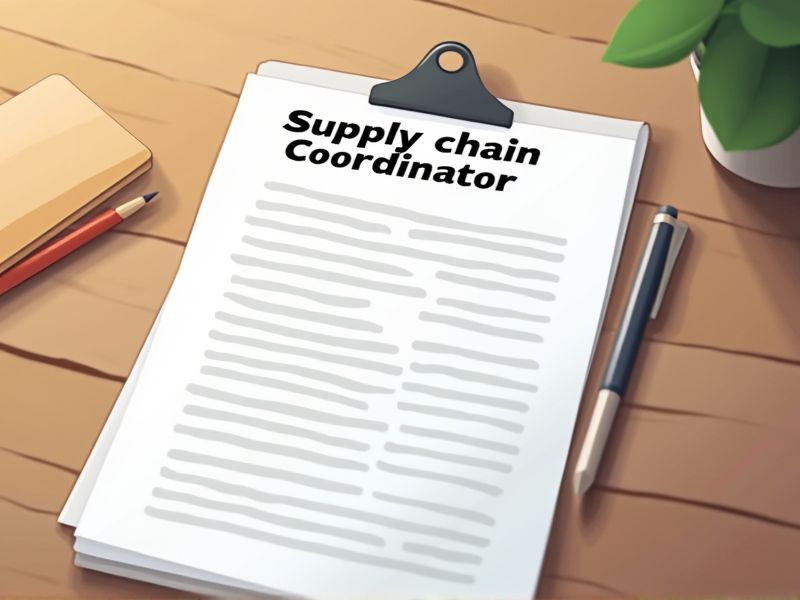
Supply chain coordinators play a critical role in ensuring efficient and effective movement of goods and services, and having specific certifications can significantly enhance their capabilities. Certifications in supply chain management validate a coordinator's expertise in logistics, inventory control, and process optimization, which are essential in minimizing disruptions and reducing costs. These qualifications also provide a standardized measure of knowledge, making individuals more competitive in the job market. Some important certifications you may need as a supply chain coordinator include APICS CPIM, CSCP, and CLTD.
APICS Certified Supply Chain Professional (CSCP)
Earning the APICS Certified Supply Chain Professional (CSCP) credential enhances a supply chain coordinator's understanding of global supply chain processes, enabling better integration and efficiency. The certification provides advanced knowledge, which can improve decision-making and strategic planning capabilities. With the CSCP credential, a coordinator is better equipped to identify and mitigate risks, reducing delays and potential losses in supply chain operations. Additionally, the certification often increases career prospects and earning potential, making coordinators more competitive in the job market.
APICS Certified in Production and Inventory Management (CPIM)
Earning an APICS Certified in Production and Inventory Management (CPIM) credential enables a supply chain coordinator to grasp complex production and inventory strategies. This certification enhances a coordinator's ability to optimize supply chain workflows, leading to increased efficiency and reduced costs. A deeper understanding of demand forecasting and inventory management fosters greater accuracy in fulfilling customer orders. Holding a CPIM designation often results in better career advancement opportunities within the industry due to recognized expertise.
Institute for Supply Management Certified Professional in Supply Management (CPSM)
Earning the CPSM certification demonstrates a comprehensive understanding of supply chain management, which enhances a coordinator's ability to make informed decisions. This credential, recognized globally, signals expertise in areas such as supplier relationship management and procurement, increasing job competitiveness. The CPSM equips supply chain coordinators with updated skills and knowledge, crucial for adapting to industry changes. Requiring continuous professional development, the certification ensures coordinators remain current with best practices and emerging trends.
APICS Certified in Logistics, Transportation and Distribution (CLTD)
Obtaining an APICS CLTD certification equips a supply chain coordinator with advanced knowledge in logistics, transportation, and distribution, which enhances decision-making abilities. This certification is recognized globally, providing coordinators with credibility that can lead to expanded job opportunities and potential career advancement. It ensures that professionals stay updated with the latest industry standards and practices, enabling them to optimize supply chain processes effectively. CLTD-trained coordinators often contribute to increased efficiency and cost savings within an organization, leveraging their specialized skills.
APICS Certified Supply Chain Analyst (CSCA)
The APICS Certified Supply Chain Analyst (CSCA) credential provides supply chain coordinators with a structured understanding of fundamental supply chain concepts, enhancing strategic decision-making and reducing operational errors. As supply chain complexity grows, possessing the CSCA certification ensures coordinators have the skills to optimize processes and improve efficiency. The certification gives professionals access to a broad network and resources, fostering continuous learning and keeping them informed on industry best practices. Consequently, employers may see CSCA-certified individuals as more competent in handling coordination tasks which could lead to better career advancement opportunities.
Lean Six Sigma Green Belt Certification
Earning a Lean Six Sigma Green Belt Certification equips a supply chain coordinator with essential skills to improve process efficiency and decrease waste. The certification provides a structured methodology for identifying and solving complex supply chain problems, leading to cost savings and increased productivity. It improves a coordinator's ability to implement data-driven decision-making, enhancing overall operational performance. Possessing this certification often leads to career advancement opportunities, as employers value professionals who can optimize supply chain processes effectively.
Lean Six Sigma Black Belt Certification
Lean Six Sigma Black Belt Certification equips supply chain coordinators with advanced skills to streamline processes and reduce operational inefficiencies. Improved process efficiency often leads to cost reductions and faster delivery times, enhancing overall supply chain performance. Black Belt certification training provides coordinators with strategic tools for problem-solving, which can elevate their ability to tackle complex supply chain challenges. Knowledge in Lean Six Sigma methodologies can increase a coordinator's value in the industry, making them more competitive in the job market.
Certified Logistics Professional (CLP)
Certified Logistics Professional (CLP) designation can enhance a supply chain coordinator's ability to efficiently manage logistics processes by providing specialized knowledge and skills. Certification tends to validate a professional's expertise, improving their credibility within the industry and potentially leading to better career opportunities. The structured learning involved in obtaining a CLP enables coordinators to stay updated with the latest trends and technologies in logistics. This can ultimately improve operational efficiency and decision-making capabilities, essential for optimizing supply chain functions.
Project Management Professional (PMP)
Achieving the PMP certification equips a supply chain coordinator with enhanced project management skills, leading to improved efficiency in handling complex logistics operations. It provides a structured framework, fostering better communication and coordination across different supply chain segments. The certification ensures that coordinators can manage risk effectively, thus reducing potential disruptions in the supply chain. Having PMP credentials often results in better career advancement opportunities and industry recognition within supply chain roles.
International Supply Chain Education Alliance Certified Supply Chain Professional (ISCEA CSCP)
Higher demand for supply chain efficiency prompts organizations to seek professionals with advanced credentials, making the ISCEA CSCP an asset. This certification bolsters a coordinator's credibility by ensuring proficiency in global supply chain management practices. Companies value the specialized knowledge and problem-solving skills that certified individuals bring, which can enhance operational performance. As supply chains grow increasingly complex, having a CSCP-dedicated coordinator reduces risk and improves strategic alignment.
Summary
With certifications, you enhance your credibility in the supply chain industry, leading to increased job opportunities. Your knowledge in logistics and operations becomes more comprehensive, resulting in improved efficiency and problem-solving abilities within organizations. Employers may perceive you as a more valuable asset, offering prospects for career advancement and higher salary potential. Certifications equip you with up-to-date industry practices, ensuring you stay competitive in a rapidly evolving market.
